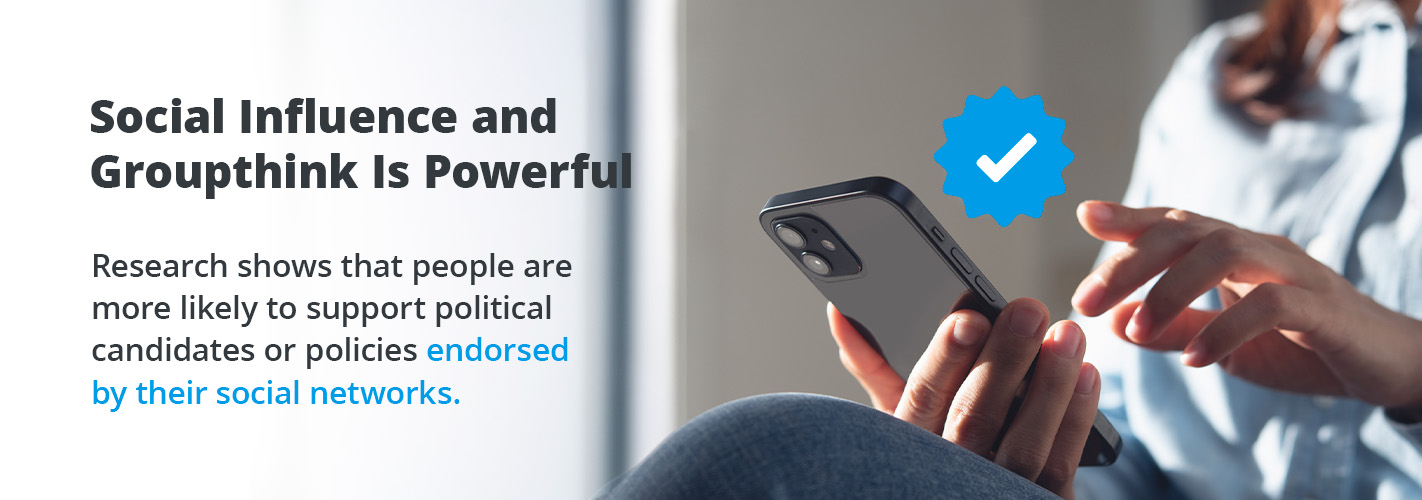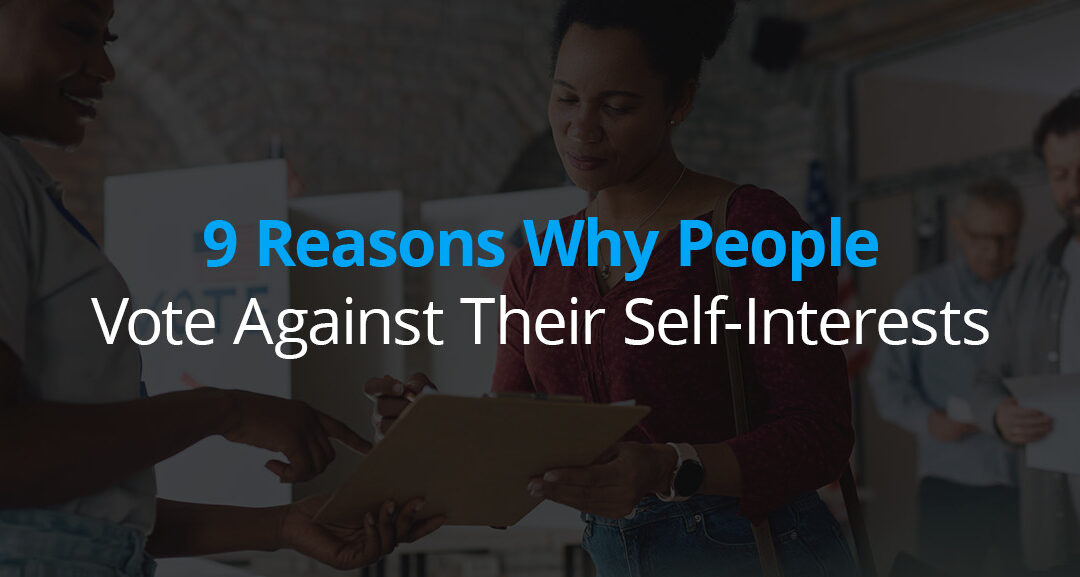Although voting against your beliefs seems illogical, political choices are driven by a complex interplay of incentives, feelings, and interpretations, and each person has a unique outlook and world experience. Nine voter motivations can only graze the surface of the nuanced thought processes surrounding topics as loaded as the presidential election and why people vote against self-interest.
1. Partisan Loyalty Can Overshadow Individual Political Candidates
In the United States, many people feel firmly aligned with either the Democratic or Republican party based on whether their views on socioeconomic issues lean more liberally or conservatively. After supporting a particular party for decades, it’s natural for people to start seeing it as a part of their identity and develop a sense of belonging. Memories of successful candidacies, support rallies, merchandise collections, and relationships formed around supporting one specific party all reinforce that connection.
If a person’s favored party elects a representative who goes against either their ideals or the convictions of the party itself, they may still feel the impulse to vote for them to keep their preferred party in power. They may even try to amend or ignore their own ideals to justify their choice. People with strong party identifications are also more likely to consume media that favors their supported party, exposing themselves to more slants against the opposing party’s candidate.
2. Identity Politics and Ideologies Are Strong Motivators
Voters often support candidates who represent their identities, including race, gender, sexual orientation, or socioeconomic status. When political parties, campaigns or candidates embody or prioritize these identities, individuals may feel a stronger emotional connection to them. People are also motivated by policies that promise better living circumstances for their social in-groups, especially if they’re currently marginalized or threatened by the opposing party.
3. The Framing Effect Shapes People’s Understanding
Information framing is the tone, phrasing and other filters through which ideas are communicated to the public, and it can significantly influence voters’ perceptions and decisions. For example, if a candidate’s policies are framed positively, emphasizing benefits rather than costs, voters may be more inclined to support them despite potential drawbacks. Candidate attributes like youthfulness or gender identity can also be framed as negative or positive to appeal to different audiences through different avenues.
Patriotism is an ideal that campaigns carefully frame to win over fence-sitters and instill passion in supporters. If a voter is essentially a centrist ideologically but cares deeply about and is proud of their country, they may very well give their vote to whichever candidate presents as more patriotic. Candidates often frame their opposition as less patriotic by comparison, cherry-picking policies or attributes that make them seem more “foreign” leaning or threatening to the country’s dignity.
4. Social Influence and Groupthink Is Powerful
Social influence is pivotal in shaping voter behavior, as people often look to their social circles for guidance on political choices. This phenomenon can lead to groupthink, where the desire for harmony or displaying loyalty within a group results in decision-making that contradicts a person’s logic and beliefs. People may suppress dissenting opinions and prioritize consensus over critical analysis, leading them to vote against beliefs they value to better align with their peers.

Research shows that people are more likely to support political candidates or policies endorsed by their social networks, especially when these endorsements are framed positively. This can create echo chambers where only certain viewpoints are validated, reinforcing existing biases and reducing exposure to alternative perspectives. The emotional bonds formed within groups can amplify the effects of social influence.
5. Information Overload Can Lead to Confusion
The average voter is bombarded with information in numerous formats daily, from television advertisements, billboards, and late-night shows to podcasts, forum posts, and social media threads. There is so much information — and misinformation — available about everything from the policies to the personal lives of political candidates that voters can find it overwhelming to logically sift through all the data and land on a choice they truly feel they can justify.
6. Educational Background Affects Voting Outcomes
Studies on the relationship between people’s beliefs and voting habits reveal that the better educated a voter is, the more likely their choice of candidate is to align with the ideologies they support. According to research by Political Science Professor Diogo Ferrari from the University of California published in 2021, individuals with less formal education are more likely to focus on a single policy from a candidate they find appealing while overlooking other policies that may not be in their best interest.
7. Cultural or Religious Values Inform Morality
Many people build the foundation of their beliefs on their religion and the cultural norms that develop alongside it. If a party or candidate openly promotes policies that contradict the rules or interests of their religion or culture, they will likely lose favor with that group. If a party voices active support for the preservation of specific religious or cultural values, they’re more likely to ingratiate themselves with members of that group, even if the individual voter prefers most of the policies of their competitor.
Religions that hold regular gatherings create opportunities for voters to be influenced by authoritative figures in their belief system. If an imam, preacher or another prominent member of the worship group voices their support for a particular candidate, especially on religious grounds, their followers may feel inspired or even pressured to follow suit. On the other hand, some voters strongly believe in the separation of “church” and state, inclining them to vote for whichever party has no or less overt religious preferences.
8. Relatability and Personal Stories Build Connections
Relatability plays a crucial role in how voters connect with political candidates. When they share personal stories or experiences that resonate with voters’ lives, it creates an emotional bond that can outweigh policy differences. Voters often prefer genuine-presenting, approachable candidates, believing they understand their struggles and aspirations. This connection can lead individuals to support candidates who might not align perfectly with their policy preferences but who they feel represent their values and experiences.
9. Openness to Change Informs Voting Choices
Some voters will stick to a party simply because they are familiar with it and, therefore, perceive it as “safer.” Even if the socioeconomic landscape has not been favorable for many years or the party’s policies have shifted away from the person’s favor, voters may continue to elect the long-standing ruling party under the assumption that “the devil you know is better than the devil you don’t.” People vote interests into action often out of self-preservation rather than progression and reform.
However, when doing independent research in preparation to vote, people tend to seek out information that aligns with their preexisting beliefs while dismissing contradictory evidence. This tendency is known as confirmation bias and can create a conflict for more open-minded voters. While they may wish to explore new ideas, they might still gravitate toward familiar narratives that confirm their biases and vote against interests that concern them.
Talk Through Election Anxieties With Merrimack Valley Psychological Associates
Merrimack Valley Psychological Associates can help you and your family work through the challenging emotions that arise during times of political uncertainty. Our team of licensed mental health professionals offers highly personalized, compassionate support for anxiety and depression, as well as family counseling, addiction recovery, and more.
Reach out and schedule an appointment, or set up a teletherapy session to get help from the comfort of your home.


